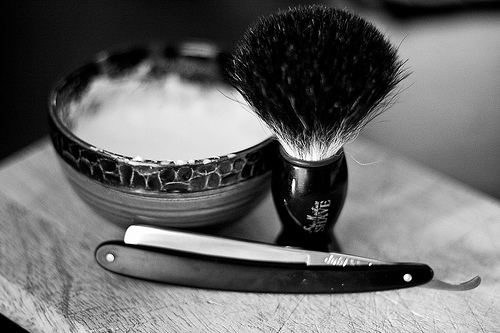Date Posted: October 10, 2011
Print Edition: October 5, 2011
 Of all the daily rituals, I find shaving to be the source of most early morning mishaps and the cause of much dissatisfaction. Whatever initial excitement that might exist when a boy first starts to shave regularly, it is quickly displaced by a monotonous disquiet. The dangers of scraping one’s face with a blade (or five of them!) does not get the heart pumping or the adrenaline running nearly as much as those Gillette advertisements would have you believe. The sad truth is that most men are damned to tug and pull with blunted cartridges until they can pony up another $50 for yet more cartridges for the latest razor named after a fighter plane. The whole enterprise is expensive and uncomfortable, but it needn’t be so. There is a better way.
Of all the daily rituals, I find shaving to be the source of most early morning mishaps and the cause of much dissatisfaction. Whatever initial excitement that might exist when a boy first starts to shave regularly, it is quickly displaced by a monotonous disquiet. The dangers of scraping one’s face with a blade (or five of them!) does not get the heart pumping or the adrenaline running nearly as much as those Gillette advertisements would have you believe. The sad truth is that most men are damned to tug and pull with blunted cartridges until they can pony up another $50 for yet more cartridges for the latest razor named after a fighter plane. The whole enterprise is expensive and uncomfortable, but it needn’t be so. There is a better way.
Some time ago, I decided to leave the multi-bladed world of modern razors behind. For awhile, I just didn’t shave. That was a terrible decision; I need to shave every day (or at least every other day), unless I want to inflict even more scruffiness upon the world than usual. Going without shaving for a couple of weeks resulted in the truly terrible beginnings of a mediocre beard. All the best beard advice I’ve ever received demanded that a man put down his razor for a full month. After two weeks without slicing and dicing, I gave in and cracked open a bottle of shaving foam and hacked it all off, starting with the neck beard.
So foiled, I turned to the internet and that’s where I found the answer to my burning desire for a better shave. A long time ago, before the Baby Boomers ruined everything, Gillette and other such companies made something called a “safety razor.” Often metal, this device allowed a man to use disposable razor blades, and to shave without being in danger of slitting one’s throat. They were the standard all throughout North America and the West until the introduction of plastic and multi-bladed razors in the final decades of the twentieth century. The ones made fifty years ago by Gillette can still be found in antique shops and at garage sales, and after a quick sterilization and a fresh razor blade, they are often good to go. But there are also companies today that make and sell these classic style “safety razors” – and that’s where I got mine.
But the razor and its blades are only half the story. What is so often overlooked by shavers today is the goo that you put on your face – the shaving cream or gel. These products are almost entirely derived from petroleum and packaged in aerosol containers that do no favours to our air and water. Their function is to prime the hairs for shaving, moisturize the skin, and serve as a lubricant while you scrape off the stubble. All of these things are an important part of the wet shaving process, but all of them can be accomplished in a more satisfactory way through turning to that other traditional solution: soap.
Using a specially designed badger or boar-hair brush, a person mixes together small bits of soap with the tiniest amount of warm water. The soap froths and generates foam which is then deposited on the brush, which you then use to “paint” on the foam in the same way that you spread regular shaving cream or gel all over your face. The result is a warm lubricant perfect for nixing the stubble but without the gunk that often accompanies the regular shaving foam.
The initial investment into a classic style safety razor and a badger or boar-hair brush may at first appear to be extravagant. I paid not quite $150 for everything (safety razor, badger hair brush, mixing bowl, almond shaving soap, 100 razor blades) but it’s unlikely that I will ever again have to buy a new razor or brush. The soap by itself cost less than $10 while a package of 100 razor blades cost me $11.50 after tax. My father, who continues to use the latest fighter plane multi-bladed razor, regularly spends $40 or more on a package of five cartridges which must regularly be replaced.
The result of using a safety razor and a badger brush with soap is not simply lower cost. I get a demonstrably better shave than I ever did using the “regular” shaving products, and more importantly, I actually enjoy shaving again. If you’ve found yourself unsatisfied with shaving, then perhaps you’ll find a measure of salvation with badger and blade, too. I certainly have.

